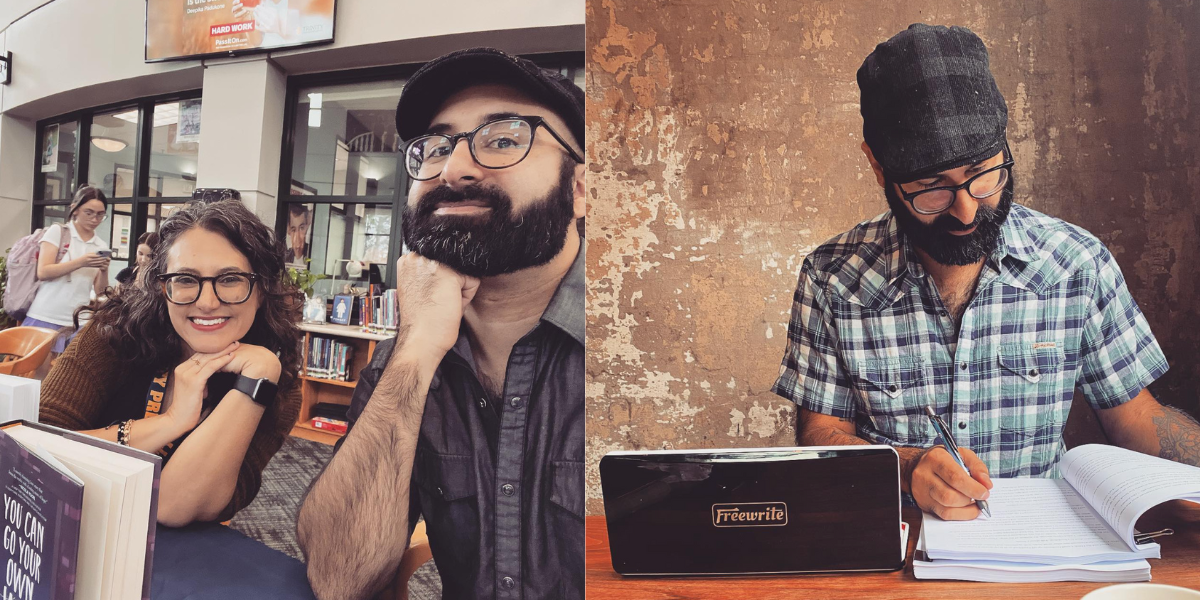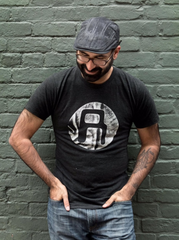
By Eric Smith
The last few years in my author life have been all about collaboration.
Me and Lauren Gibaldi’s anthology, First-Year Orientation, came out earlier this year, a joyful project that we worked on all through 2021 and 2022, collecting interconnected short stories set at an imagined small college in New Jersey. It’s all about that transition between high school and college, that complicated, sometimes magical first day, and features some of our favorite authors.
At the same time, I was also fussing over Jagged Little Pill: The Novel, a collaboration between Alanis Morrisette, Diablo Cody, and Glenn Ballard. It’s a novel inspired by the Tony and Grammy award winning Broadway musical and expands on the teens you meet in the show.
Jagged Little Pill came out last year, and is due out in paperback this August, while First-Year Orientation just came out this spring.
These last few years have been tough, finding the time to write while juggling a busy day job that also involves books (I’m a literary agent), navigating the challenges of childcare, and living through a pandemic. But one of the things that has made this process easier, that’s driven me to actively find that time, has been working with other artists I adore. How do you find joy and inspiration when times are tough?
Co-writing, collaborating, and turning to your friends.
Anyone who knows me, knows how much I adore Lauren Gibaldi. Her first three Young Adult novels are masterworks of contemporary kid-lit, reading like warm hugs while also pulling no punches when it comes to the emotional heft. The Night We Said Yes, Autofocus, and This Tiny Perfect World are really just so perfect, so gentle, so special. Getting to collaborate with her on First-Year Orientation and our first anthology, Battle of the Bands, is one of the greatest highlights of my writing career.
Every email and text and phone call from her while we wrestled with this collection, especially on days where I was struggling to be a good collaborator due to childcare hiccups, made me feel less like I was stumbling in the dark. A good collaborator, like Lauren, is exactly that. A light along the way. A friend.
And here’s the thing about collaborating. Not only does it make the writing process feel less alone, particularly in times that feel, and are, so wildly difficult to navigate. It can also make you a better writer. Because without a doubt, your collaborator will start to rub off on you in ways you don’t expect.
While working on Jagged Little Pill, my favorite note came from Diablo Cody, who left it in the margins of the manuscript for me… “Take more risks.”
I had been staying as close to the Broadway musical as I possibly could, and she wanted me to dig in further. Explore what wasn’t being said. Peer around corners.
And working with Lauren Gibaldi, I feel like I was consistently reminded to dig into bits of my characters that felt a little softer and bring that to the surface.
It’s a strange balance, having one author tell you to be riskier, darker, heavier, and another reminding you to be more of a cinnamon roll. But bringing all that advice together, I think, made me a better writer at the end of the day.
My first solo book in two years, With or Without You, is due out later this year. And I think a lot of what readers are going to see in there is a result of collaborating these last few years. Of having other, brilliant writers in my space, in my head, and in my heart, messing with what I thought I knew, and changing that all up.
So, pack up your Freewrite. A notebook. Whatever you need. Call up some friends, head to the café. Kick around some ideas together. Maybe write something.
It might just stir things up.
It might just change you.
--
Not sure where to find your writing community? We recommend starting with NaNoWriMo. NaNoWriMo helps you track your writing progress, set milestones, connect with other writers in a vast community, and participate in events that are designed to make sure you finish your novel.
Freewrite is a proud sponsor of NaNoWrimo, with writing challenges every November, April, and July! Check it out.
--

Eric Smith is a literary agent, Young Adult author, and Freewrite Ambassador from Elizabeth, New Jersey. As an agent with P.S. Literary, he’s worked on New York Times bestselling and award-winning books.
His recent novels include the YALSA Best Books for Young Readers selection Don’t Read the Comments (Inkyard Press, 2020), You Can Go Your Own Way (Inkyard Press, 2021), the anthologies Battle of the Bands (Candlewick, 2021) and First-Year Orientation (Candlewick, 2023), both co-edited with award-winning author Lauren Gibaldi, and Jagged Little Pill: The Novel, which was written in collaboration with Alanis Morissette, Academy award-winner Diablo Cody, and Glen Ballard, and is an adaptation of the Grammy and Tony award winning musical.
His next book, With or Without You, a rom-com about two teens working in rival cheesesteak trucks, publishes this November with Inkyard Press. A lifelong lover of writing and books, he holds a Bachelor of Arts from Kean University in English, and a Master’s in English from Arcadia University, where he currently mentors MFA students. He lives in Philadelphia with his wife and son, and enjoys video games, pop punk, and crying over every movie.




















